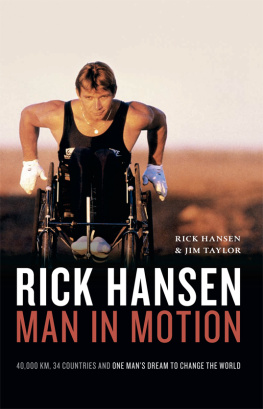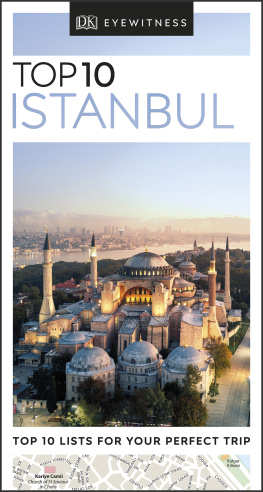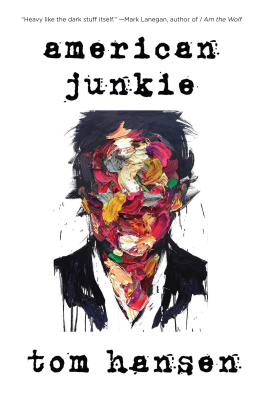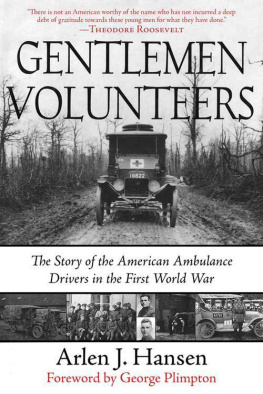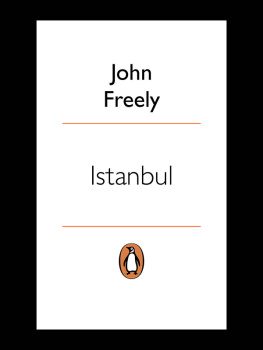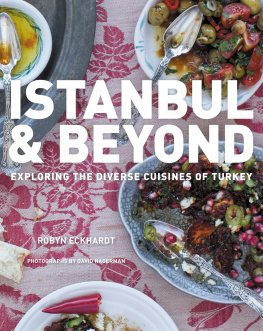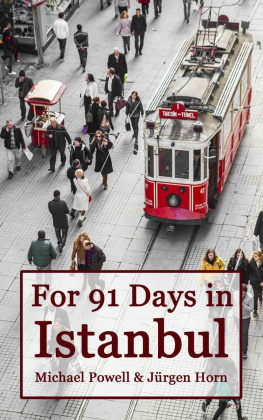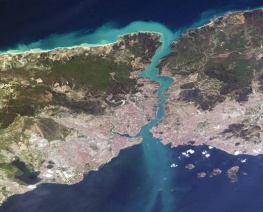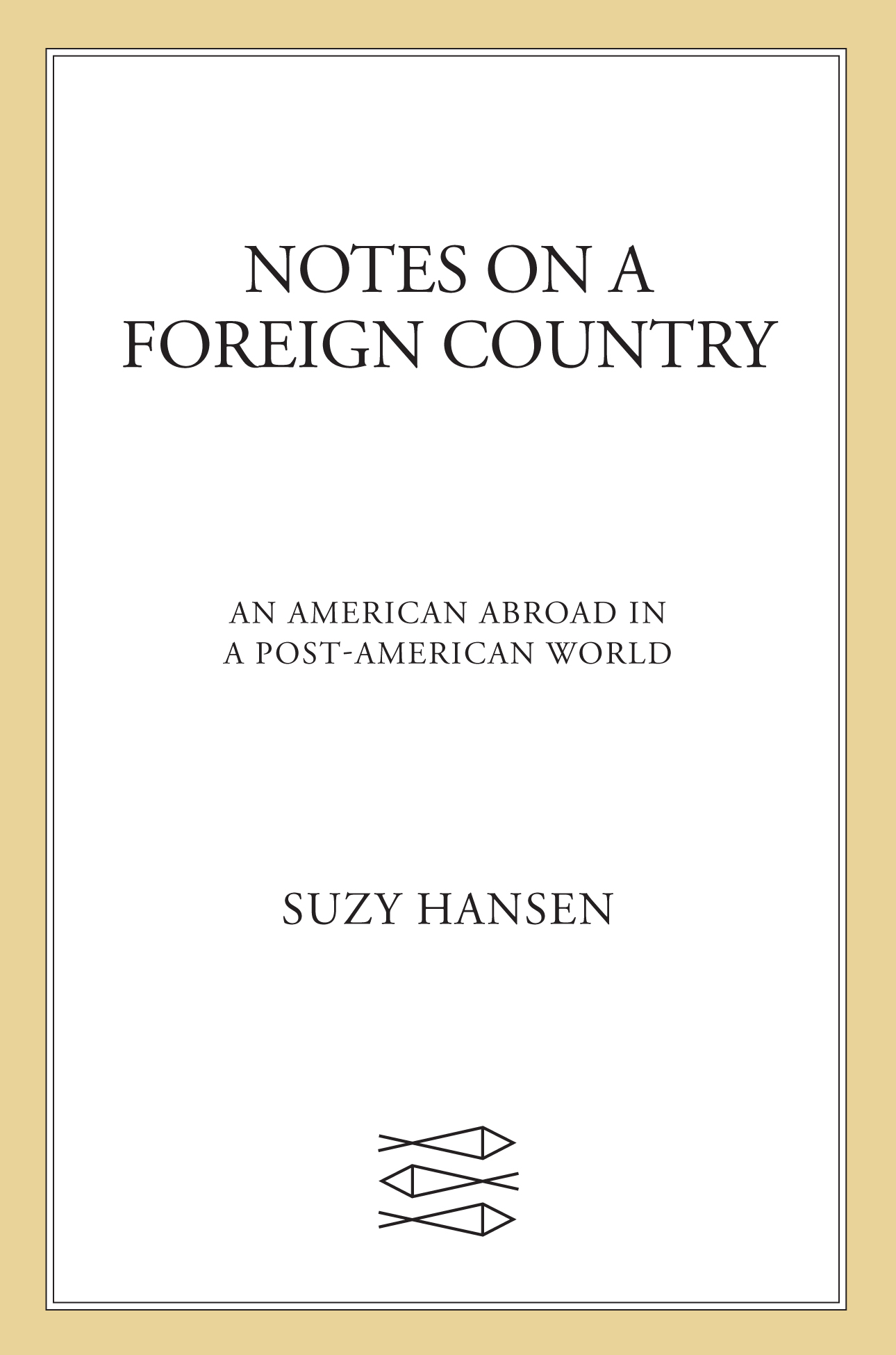Contents
Guide
Pagebreaks of the print version

The author and publisher have provided this e-book to you for your personal use only. You may not make this e-book publicly available in any way. Copyright infringement is against the law. If you believe the copy of this e-book you are reading infringes on the authors copyright, please notify the publisher at: us.macmillanusa.com/piracy.
To my family, who let me go, and to P & M, who told me to write
The pretensions of virtue are as offensive to God as the pretensions of power.
REINHOLD NIEBUHR
A womanthe statue of a woman
lifting in one hand a rag called liberty by
a document called history, and with the other
hand suffocating a child called Earth.
ADONIS, A GRAVE FOR NEW YORK (1971), TRANSLATED BY SALMA KHADRA JAYYUSI
Some are guilty, while all are responsible.
ABRAHAM JOSHUA HESCHEL
It is still not clear if the United Statesa country formed in great measure by those who have themselves escaped vast catastrophes, famines, dictatorships, persecutionit is far from certain that the men and women of this nation so full of hope and tolerance, will be able to feel that same empathy towards the other outcast members of our species.
ARIEL DORFMAN
A FTER I HAD LIVED in Turkey for seven years, I visited a town called Soma, where two months earlier, a coal-mine fire had killed 301 men. Soma was located in western Turkey, slightly inland from the coastal city of Izmir, and to get there, my friend and I took a ferry from Istanbul to a town across the Sea of Marmara and rented a car. It was Ramadan then, and summer, and the townspeople, most of them observant and fasting for the holiday, moved slowly, as if they had been drugged. We stopped to eat cheese pide on benches by the seaside and watched shipping tankers as big and menacing as mountains glide too close to the shore. Women in head scarves strolled along the water, their children spinning away from and back to them like boomerangs skirting the pavement. I remembered how, when I first moved to the country, I had been surprised that someone wearing a head scarf would want to hang out at the beach. Everything surprised me then.
Turkey was a pleasant place to drive, its smooth roads lined with honey stands and olive oil kiosks and extremely tempting signs for Kangal puppy farms. (Kangals, native to Turkey, were sheep-guarding dogs that fought off wolves, so seeing them in innocent puppy form was like seeing a child before a lifetime of hard labor.) The Turkish highways, and the factories and depots that dominated them, always felt strangely like the East Coast of the United States. The entire countryeven Istanbulwas not nearly as exotic as most people expected; it was not exotic anymore to me at all. By then I would also wonder whether the western Anatolian roads might have looked familiar because the Americans funded much of Turkeys postwar reconstruction with Marshall Plan money, everything from its roads to its schools to its military bases. As we drove, I had that disconcerting sense of dj vu that I often had when traveling through foreign countries, as if I had been there before.
We were heading to Soma to research an article for a magazine, but the catastrophe disturbed me for reasons beyond journalistic curiosity. After the fire, the prime minister, Recep Tayyip Erdoan, had visited Soma, and many townspeople protested in the streets because they blamed his government for the mines dilapidated condition. One of the prime ministers men, wearing a dark, expensive suit, was photographed kicking a protestor on the ground. I remember thinking, The government is kicking a citizen in the town where 301 men have just been killed and families are mourning . The horror of Soma somehow seemed connected to the larger disintegration of the Middle East: the jihadists passing through Turkey on their way to Syria, the daily reports of terror, the disappearance of national borders. The question in my mind had stopped being how did it all fall apart, but when did it all begin.
Around that time, 2014, I noticed that both Western and Turkish friends had begun debating whether life had gotten better or worse. Terrorism, the refugee crisis, economic inequality, and climate change prompted these discussions, but sometimes the question came up around subjects more personal, such as the decision to have children. Before, people had to worry about the bomb, a friend argued. It was much worse fifty years ago. But I had the feeling now that our fears had become more personal, not of collective annihilation but of being torn limb from limb. Earlier that year, my friend, a photographer, offered me a print from her vast archive. There were photos of women in brightly printed dresses in Kenya, of teak trees in Bhutan, of a wedding couple dancing in India, and many were stunning, the sort of thing you might want on your wall. Yet I chose the stark, colorless desert photo of hundreds of tiny, faceless refugees sprawled across a hillside, crossing from Syria to Iraq, because in 2014, what other photo could you choose? It wasnt a time of dancing.
In Turkey, one of those still-modernizing, ascendant countries, life was supposed to have gotten better. The Soma accidentin which it became clear that human life in Turkey had been substantially devaluedwas the moment, for me, when this myth of progress collapsed. Is there life after Soma? someone spray-painted on the sidewalk outside my apartment window. Like my photograph, the phrase captured the mood. I went to Soma because, like everyone, I wanted to understand how it happened. I was interested in all the gory technical aspects: the methane gases and the way coal burned and the standard safety rules for coal mining. I expected the reasons to be specific to Turkey, specific to that company and to that coal mine. I had in mind a scientific excavation, and instead, as seemed to be common in the years I lived abroad, the excavation I ended up with was historical.
* * *
WHEN WE ARRIVED, Soma was still heavy with tragedy. Signs hung from the buildings that said OUR PAIN IS IMMENSE . The hotel clerk at the Linyit Otel eyed us warily, frowning when we said we were journalists. He, like many shop owners and businessmen in Soma, didnt like the arrival of the foreigners, or the out-of-town activists, or the labor union radicals. Dont get mixed up in this stuff, people would say to us, to one another. Dont cause trouble.
My companion, Caner (pronounced Jahn-ehr), my oldest friend in Turkey, made my coming to Soma much easiernot only because he was a man but because he was Turkish. Caner could also see things in Turkey that I could not; often he could see things about the world that I could not. After I wrote the story about Soma, for example, Caner helped with the fact-checking, which for this magazine, The New York Times Magazine , was especially rigorous, if not, at times, insane. (A fact-checker and I once spent a half hour debating the difference between clubhouse and playhouse .) Caner joked with some wonder about the zeal of American journalism and I explained that the obsessiveness was not only about legal issues but about maintaining a kind of objectivity. In other words, I said, the truth. He laughed at me: But that attitude about your objectivity is political in and of itself.
Somas main street looked like many Turkish towns: well maintained and orderly. Freshly tended flower beds flanked the roads, World War I memorialsgood old Atatrk in bronzeshone as if newly polished, people scrubbed the pavement outside their shops. During the summer evenings in Soma, men, and sometimes women, gathered in one part of the central tea garden, and women and children, and sometimes men, gathered in the section called the family salon, and everyone would sit for hours smoking and gossiping past midnight. Soma wasnt a place where people went to bars, or rarely even out for dinner, but it had one fancy coffee shop with plush gray chairs, and one relatively expensive chain restaurant called Kfteci Ramiz. In these poor communities, there wasnt money for much else beyond the home, but Turkish families supported one another reflexively; a miner would work his whole life just to build two-room houses for his three sons. I was a thirty-six-year-old unmarried childless woman living thousands of miles away from her family, and had long subscribed to typical Western ideals of individualism. But with seven years of distance from New York I had come to believe that it was the Turkish family that held Turkey together, it was the strongest thing. Soma had a wholesome Mayberry quality to it, a sense of conservatism and distaste for provocation. All around the main square the watchful pillars of the community stood at the ready: the mosques, the mens teahouses, the mining company offices, the police, the ruling governments AK Party office, the mayors hall, and, in the center of it all, in a large, black-reflector-windowed building, Trk-, the union that represented the coal miners of Soma.


